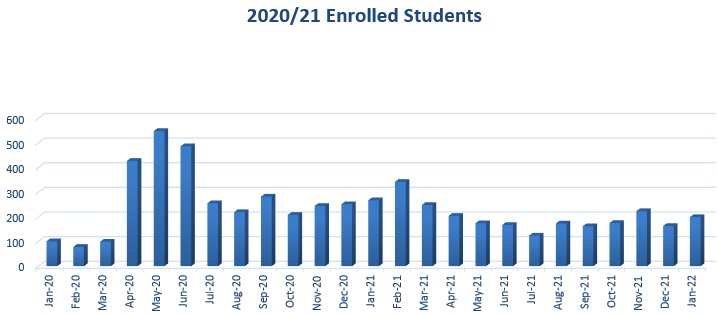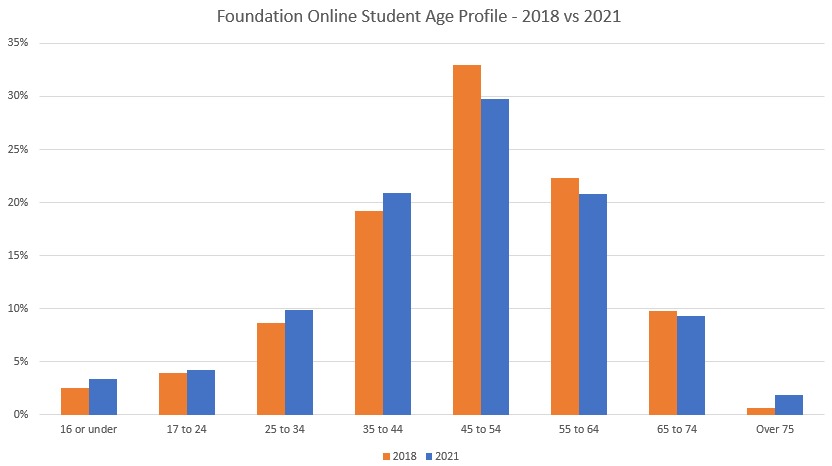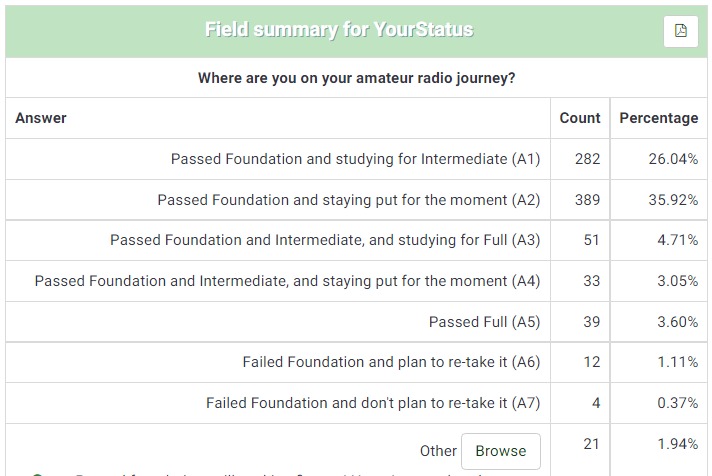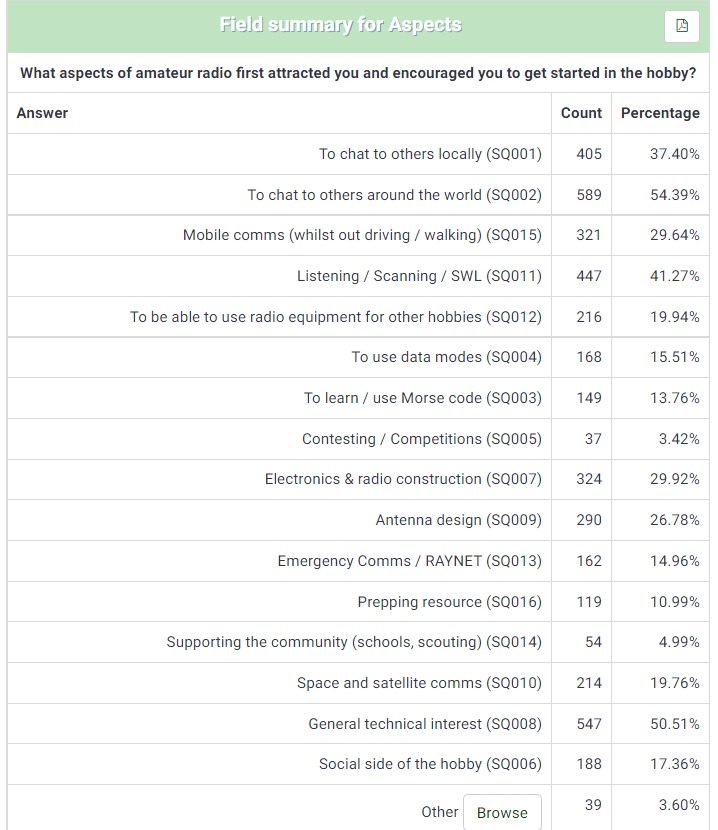Welcome › Forums › For Tutors: Discussion of UK Training, Syllabus and Exams › Club-based Exam Stats
Tagged: exams
- This topic has 5 replies, 2 voices, and was last updated 2 years, 6 months ago by
Pete M0PSX.
-
AuthorPosts
-
-
25 January 2022 at 16:11 #951
Pete M0PSX
KeymasterThe RSGB’s November 2021 Board Minutes include stats for club-based exams. Take-up of exams at club-level has been minimal, despite the high interest shown by trainers in our 2021 tutor survey.
Exam booking for clubs started from the 6th of October. In the six week period, only 4 online club exam sessions were booked (6 candidates). As for paper exams at club-level, there were only 8 applications (20 candidates). As a reminder, paper exams are due to be phased out except in special circumstances.
I’d be interested to know what the reason is for slow uptake in exams at clubs – is it a lack of students, issues with venues and Covid, or down to volunteers not being keen on a return to training post-Covid?
Best regards,
Pete M0PSX
-
This topic was modified 2 years, 6 months ago by
Pete M0PSX.
-
This topic was modified 2 years, 6 months ago by
-
25 January 2022 at 22:28 #954
M0PWX
ParticipantI was discussing this on twitter earlier,
is the lack of students from clubs due to
clubs not fully up and running again with courses?
clubs running the courses but the students doing the exams online for quicker results?
students staying away from clubs and social environments due to covid?
it will be interesting to see if the trend continues on the next set of minutesalso how many clubhouses have the internet connectivity to run online exam sessions, those that do could be missing trick, quicker results, and less paperwork for the club, but it all depends on how the RSGB handles online exams from clubs
the removal of practical pretty much removes the need for students to go to a club, how much of a effect has that had?
a couple of questions for you pete, not sure you have the stats, but
since the online exams and removal of practicals has there been any change in the average age of students you are seeing go though the courses
also now clubs can operate again are you seeing any drop off in the number of students indicating clubs are recovering, if no change will that mean a slow reduction in the number of clubs as few join?
so many questions, so few answers
Peter
M0PWX -
25 January 2022 at 23:27 #955
Pete M0PSX
KeymasterHi Peter,
Some great questions. Not sure I have all the answers, but I can have a stab.
Lack of students at clubs
Probably several reasons:
– Convenience – study at home when you’re in the mood, vs travelling to a venue at a fixed time
– Availability – Some clubs only run one or two classes a year, if any. Waiting six months to a year just isn’t an option for some
– Cost. Most clubs charge (to offset venue hire) – online is free
– No travel required
– People uncomfy about going out / mixing indoors
– Some clubs seem to have given up, or not returned to training post-Covid
– Poor web presence / PR for local coursesIn our student survey, we ask “I preferred taking my exam online compared to at a local club:
Strongly Agree 57.25%
Agree (A2) 27.15%
Disagree (A3) 5.36%
Strongly Disagree 1.02%Change in age
I can work that out – I’ll do a comparison between 2018 and 2021. Let me get back to you on that one.
Dropoff in students
Club exams restarted in October. I’m seeing no real impact on our online enrolments. Here is the graph for 2020-2021:

Next steps for clubs
I’ve stated this view elsewhere with mixed responses, but I think clubs need to adjust their approach to circumstances, just like the online course providers did. Pre-2020, clubs got students because clubs were the only route in – people had no other choice, so clubs had people seeking them out. Now, it’s not so easy, so change is needed. Actually, I see the change as a massive opportunity for clubs – let students get licenced online, and then offer practical sessions for the newly-licensed. Many who study online will have never seen a radio, ATU, etc, so put on some hands-on sessions, demos, show-and-tell. Genuine training on what newbies want to know, not just delivering the tickbox practicals – training without the need to conform to the syllabus or have the admin overhead of assessments – just fun hands-on training (something that can’t be done online). Better for clubs, better for students, and probably helpful at keeping those newbies interested, learning and progressing.
Pete M0PSX
-
26 January 2022 at 00:14 #956
Pete M0PSX
KeymasterHi Peter,
I’ve crunched the 2018 vs 2021 demographic data – here’s the graph

2018 2021 16 or under 2.5% 3.4% 17 to 24 3.9% 4.2% 25 to 34 8.6% 9.9% 35 to 44 19.2% 20.9% 45 to 54 32.9% 29.8% 55 to 64 22.4% 20.8% 65 to 74 9.8% 9.3% Over 75 0.6% 1.8%If it’s helpful, here are the RSGB’s 2018 and 2020 numbers (no 2021 numbers as yet):
2018 2020 0-14 5.0% 2.8% 15-19 5.9% 3.4% 20-29 7.7% 7.3% 30-49 12.0% 16.2% 40-49 20.4% 21.9% 50-59 25.6% 31.3% 60-69 17.4% 13.7% 70-79 5.5% 3.3% 80+ 0.5% 0.2%Hopefully of interest…
Pete
-
This reply was modified 2 years, 6 months ago by
Pete M0PSX.
-
This reply was modified 2 years, 6 months ago by
-
26 January 2022 at 09:51 #958
M0PWX
ParticipantInteresting so no real change on the age groups, that is a surprise I was expecting to see more of a change to a slightly younger range as they tend to be happier with tech and online services, but then again radio is a technical hobby so that may account partly for that
And no real drop off in numbers training with you is good
I think both clubs and The RSGB are going to have to adapt over the next few years, or face difficulties
I wonder if we will start to see more online clubs? with occasional meets, and cross hobby collaborations like Essexham have with the makers?
Time will tell, but it will be interesting to see how it plays out
The other stat that would be interesting is if the number of new hams that progress to intermediate and full licenses has changed due to the online exams? as clubs ran those courses even less frequent than foundation
That may be a good follow up survey you could ask previous students 6-12 months after they pass
Sort of a few questions like
Are they still active on air
Have they progressed to intermediate / full?
Year they passed each level
Do they use HF, VHF or both
Have they learnt or started to learn morse?
Do they use digital mode, voice or both?
Have they been to or joined a club?You could even make it a yearly general survey to see if any trends start to show
Peter
M0PWX
-
26 January 2022 at 11:59 #960
Pete M0PSX
KeymasterYes, expecting a slightly younger shift makes sense, but it may be balanced out by interest from the older generation who may previously have been not able to travel to clubs in the past, finding the online route more convenient and easy to achieve during lockdown. Data seems to show a doubling of interest across all age groups since the first lockdown.
As for clubs – as always, the agile clubs that can adapt will do well. Some are already seizing the opportunities that online exams offer – there are several thousand newbies who’ve passed without touching a radio and likely to need help from their clubs. Clubs putting on hands-on sessions and practical nights will be more appealing than the tea/talk/raffle social clubs. There’s been increasing talk about the “Hub” model, where like-minded people find new ways to network and communicate, without the need for club venues, committees, constitutions and politics. As you say, be interesting to see how things develop post-Covid.
On the last point, our latest survey catches some of that:

and

Some of the other questions you ask may give interesting results, but I always try to ask questions to gather data on how things can / should change going forward. Questions our group asks tends to help with developing site content and updating training material. I suspect other groups need different data. If I were running a traditional club, I’d be polling members and local non-members to find out what locals want from their club.
I think the challenge going forward is a) keeping the online momentum going, and b) local clubs helping newbies to keep them interested and active.
Pete M0PSX
-
-
AuthorPosts
- You must be logged in to reply to this topic.

